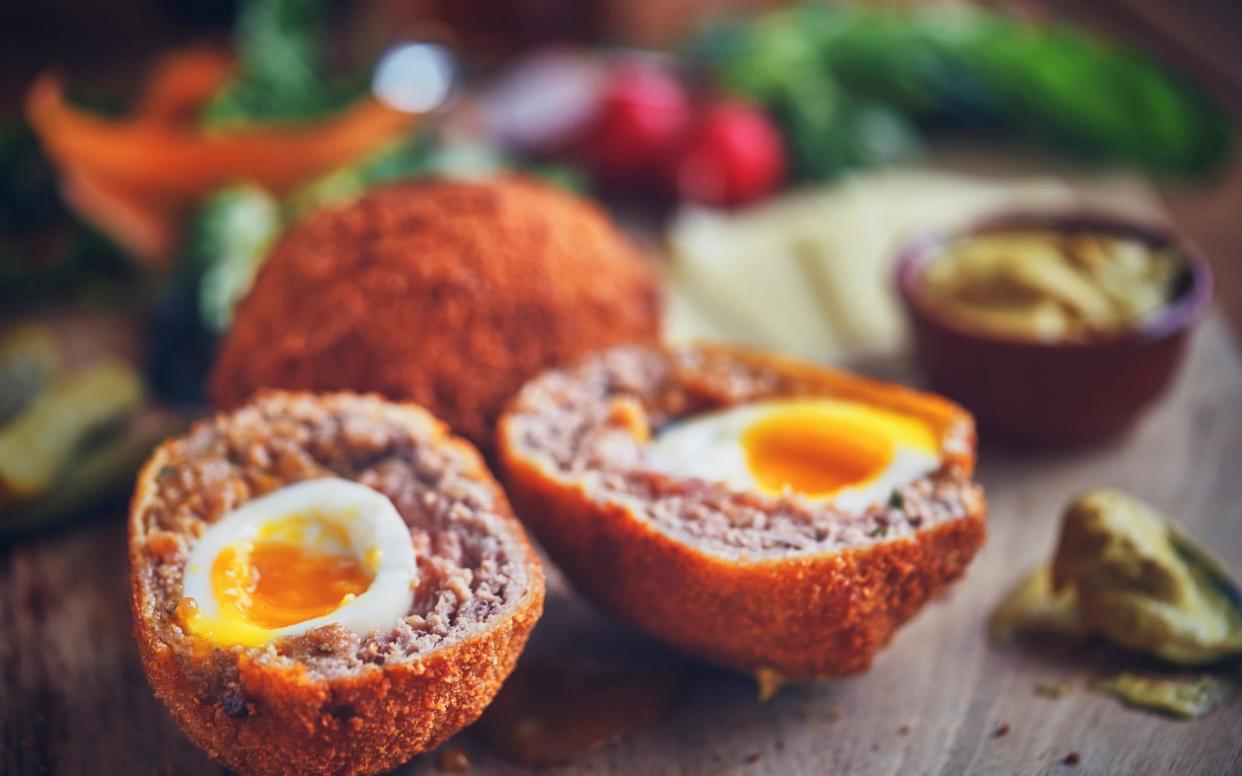Is a scotch egg really a substantial meal? The nutrition experts weigh in

It's been discussed in Downing Street and on Twitter: is a scotch egg a substantial meal? Well, yes and no.
Speak to George Eustice, the Environment Secretary, and he’ll concede that maybe it is “as a starter” – a position for which he's been roundly mocked. Cabinet minister Michael Gove goes further, telling LBC radio listeners that you’ve got to eat two scotch eggs before it counts as a meal, and only if you eat it with a pickle on the side.
The debate, known as #ScotchEggGate on Twitter, came about because under the new rules, in tier two, you can't order an alcoholic beverage at a pub without getting a “substantial meal” too.
But when I put it to Pip Sloan, the Telegraph’s assistant food editor, she told me: “A boiled egg is not a meal, and a single sausage is not a meal, therefore an egg wrapped in a sausage does not count as a meal. A meal has to be more than three bites and I can easily eat a scotch egg in three bites if I’m hungry.”
According to the NHS’s Eatwell guide, daily calorie needs are around 2,500 for men and 2,000 for women. Assuming you only drink water and don’t snack during the day, that’s roughly 666 calories per meal for women and 833 for men.
A scotch egg (which is a boiled egg covered in sausage meat and deep-fried) is fairly calorically dense. A 120g Tesco Finest scotch egg contains 311 calories. If you’re looking for something a bit more luxurious, Dukeshill Ham Company makes a Cumberland sausage scotch egg which contains roughly 358 calories So Michael Gove may be right: eat two scotch eggs with a side (pickles optional) and it does count, in calorie terms at least, as a full meal.
But what about the nutritional benefits? “Eggs offer an impressive variety of nutrients, and are notable for their levels of selenium as well as vitamins B2, B12 and D, whilst the remaining nutrients are mostly accounted for but in small amounts,” explains nutritionist Ian Marber. “Eggs also offer protein and fat but negligible carbohydrates and fibre. The addition of sausage meat and breadcrumbs adds more protein but minimal fibre and carbs.”
Surprisingly, in terms of daily intakes, you’re mostly fine with a two scotch egg meal. Our aforementioned Tesco Finest scotch egg contains 19.5g of protein, 19.9g of fat and 5.6g of saturates so, even after you’ve had two, you’re still well within the NHS’s suggested limit of 50g, less than 70g, and less than 20g per day of those particular nutrients. As long as your two other meals of the day are giving you the fibre, carbohydrates, and other nutrients you need, a double scotch egg could justifiably be called a nutritious meal, as long as it's served with a vegetable based side.
There is, of course, some argument to be made that scotch eggs, even of the homemade and gourmet variety, probably count as a processed food – a category which has been associated with increased risk of heart attacks and strokes – but eaten in moderation you should be fine.
Your next challenge? How long can you push your two scotch eggs around the plate pretending you’re still eating so you don’t have to leave the pub?

